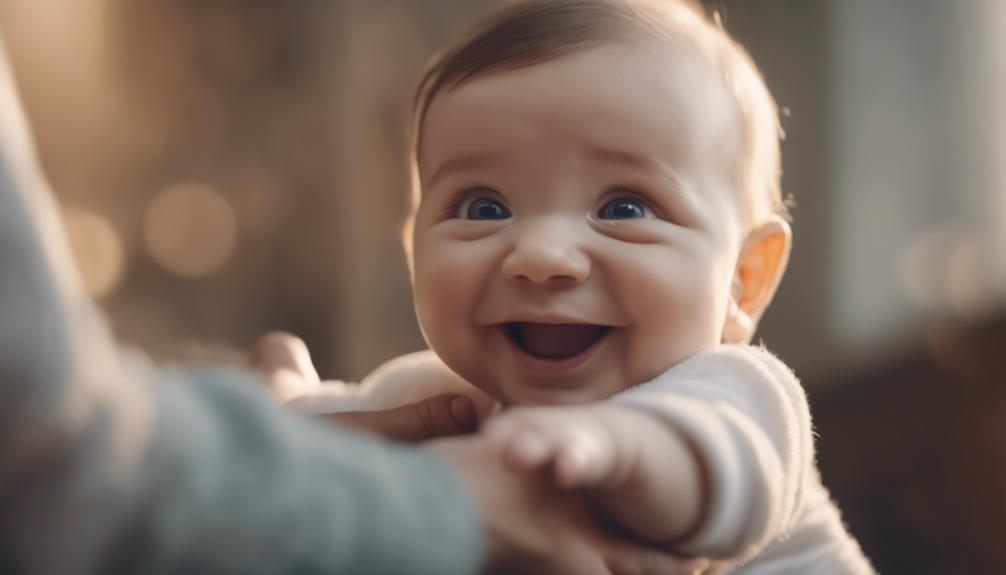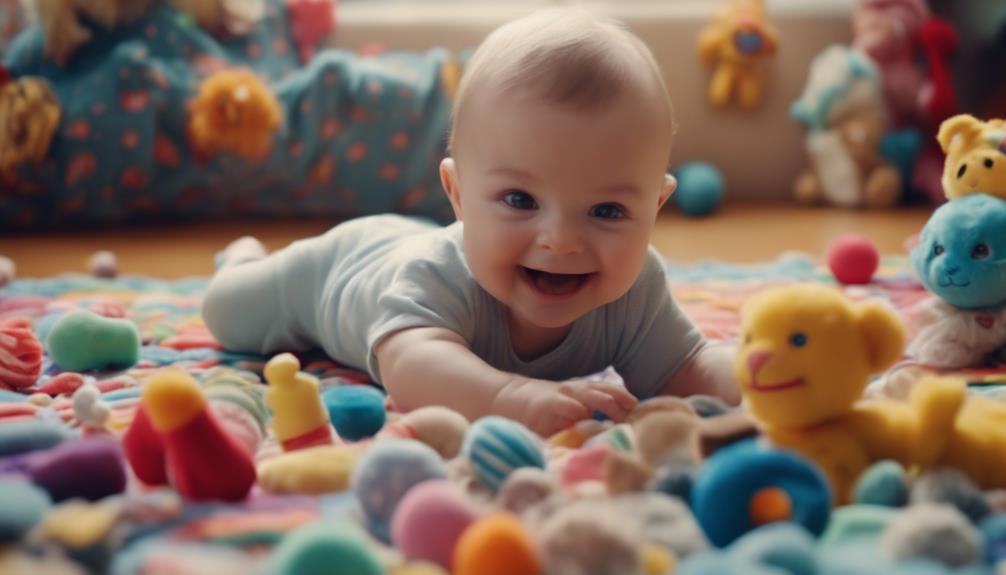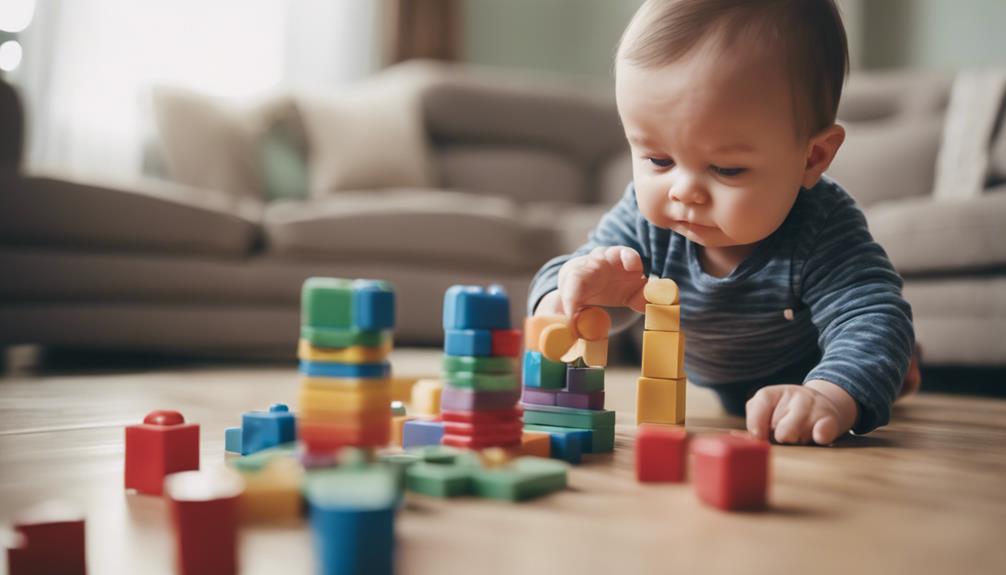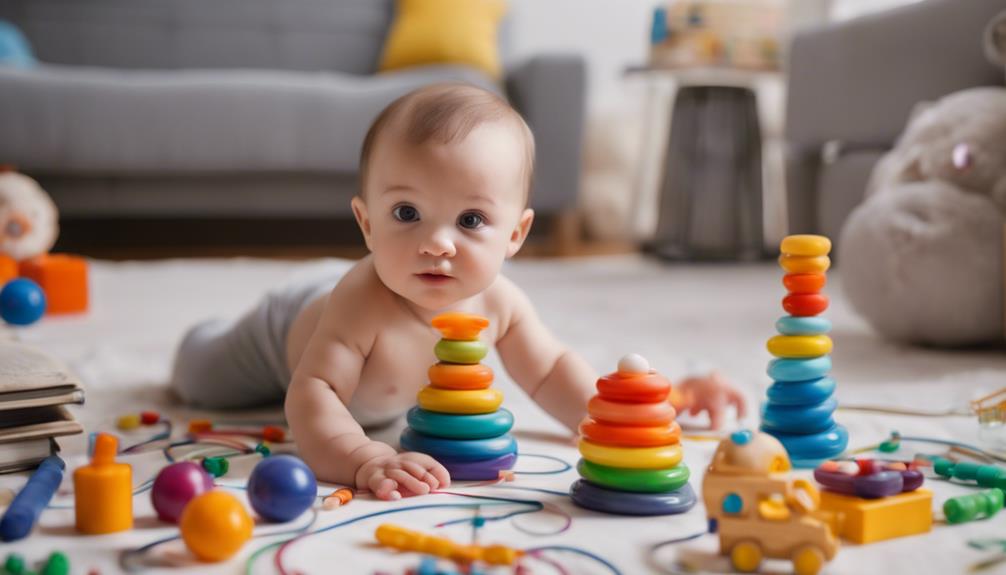When your baby gazes into your eyes, snuggles close for comfort, and smiles brightly at you, it’s their way of demonstrating a deep love and attachment. Recognizing your scent and voice, seeking your embrace, and cooing affectionately are all signs of their strong emotional bond with you. Trusting you for guidance, wanting to be held by you, and expressing joy through smiles indicate their attachment. When they turn to you in challenging times and shower you with kisses, it’s their pure way of communicating love. These actions reveal the beautiful emotional connection you both share.
Key Takeaways
- Babies show love by recognizing caregiver's scent and voice.
- Eye contact strengthens emotional connection and trust.
- Physical affection and holding create a loving bond.
- Smiles signify affection and deep attachment.
- Cooing and seeking comfort show early communication of love.
Recognizes Your Scent and Voice
From birth, your baby can recognize your scent and voice, forming a strong emotional connection. As their caregiver, your smell and sound are constants in their world, providing comfort and security. The bond between you and your little one begins with this innate recognition, showing the deep attachment they feel towards you.
When your baby snuggles close to you, nuzzling into your chest, it's not just seeking warmth but also finding solace in your familiar scent. Likewise, when they turn their head towards the sound of your voice, their eyes lighting up with recognition, it's a sign of the love they've for you.
Locks Eyes With You
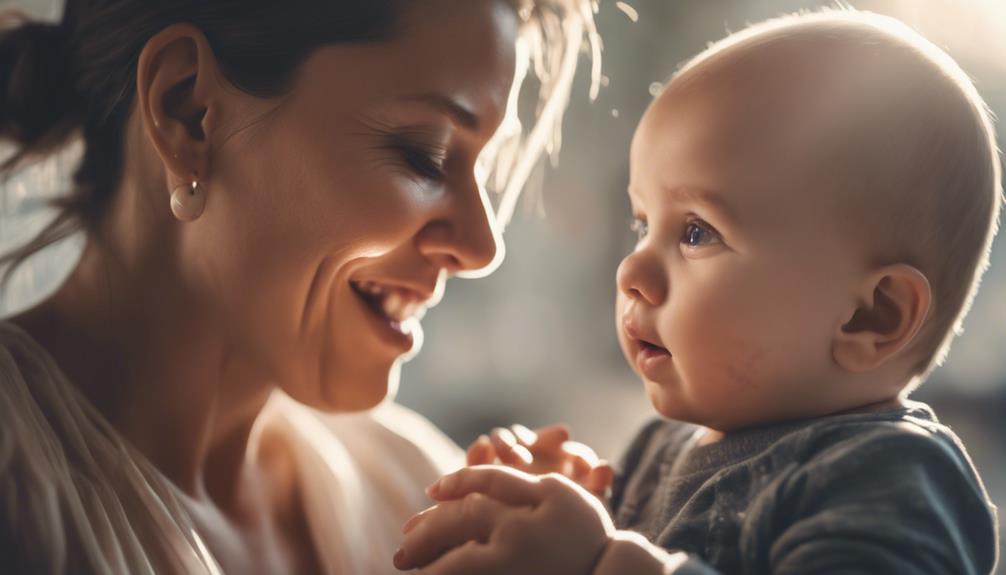
Locking eyes with your baby is a powerful way to communicate and strengthen your emotional connection. When your baby gazes into your eyes, it's a beautiful display of love and trust. This simple act isn't just about seeing; it's a key part of the bonding process between you and your little one.
Babies, with their innocent eyes, use this connection to express their feelings and build a strong attachment relationship with you. Through eye contact, your baby shows recognition and preference for the familiar and comforting presence of their parents. Those tiny eyes focusing on your face are seeking closeness, seeking the comfort of your gaze.
This mutual exchange of looks helps develop emotional connections and fosters a sense of security and love. So, take the time to lock eyes with your baby, let them see the love in your eyes, and watch as this simple act strengthens your bond in profound ways.
Settles When You Hold Them
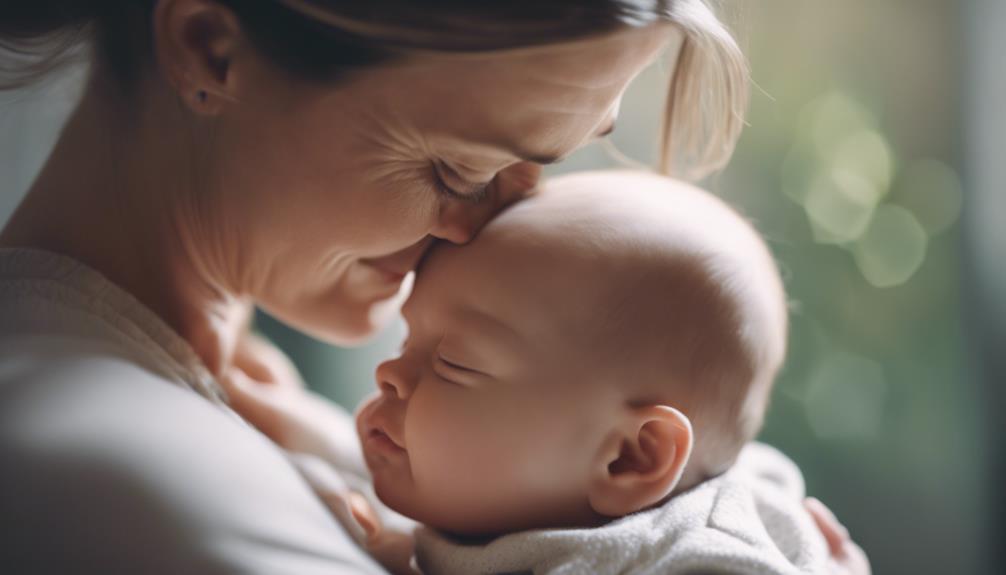
When you hold your baby, they quickly settle and feel secure in your arms. This physical affection provides a loving connection that's vital for their emotional development. Babies seek comfort and offer reassurance through the familiar touch of their caregivers.
Being a secure base for your little one not only helps them regulate their emotions but also strengthens the bond you share. The act of holding your baby isn't just about providing warmth and safety; it's a powerful way to communicate your love and care.
Smiles Directly at You
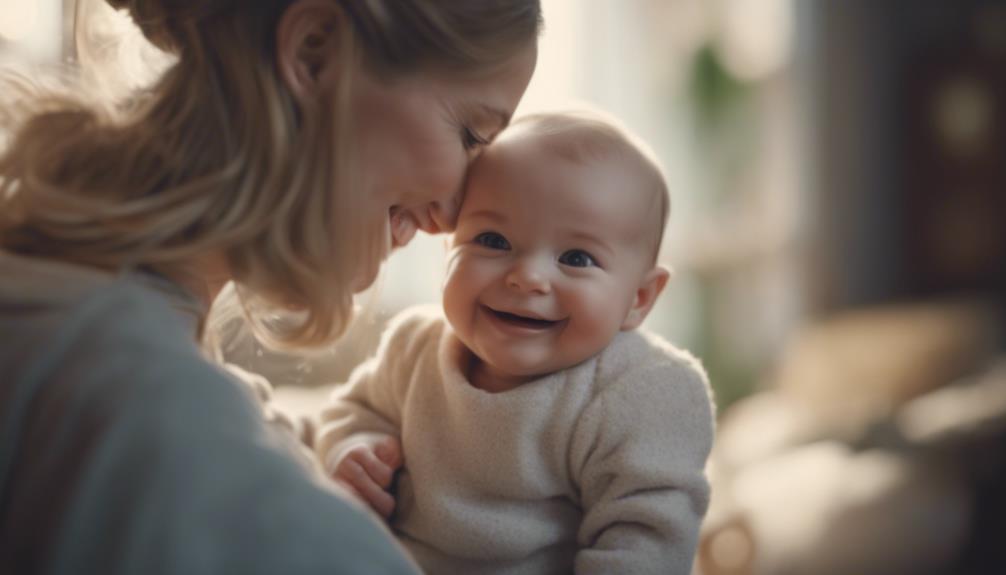
Your baby's direct smiles are a heartwarming indication of their affection towards you, recognizing and enjoying your presence. When your baby looks directly at you and breaks into a smile, it's a beautiful sign of the love they feel.
These smiles aren't just random expressions; they're deliberate gestures that show a deep emotional bond between you and your little one. Babies show their love in many ways, and smiling directly at you is one of the most heart-melting signs of affection.
It's a moment of pure joy and attachment that strengthens the connection between you.
When your baby smiles at you, take the time to smile back and engage with them. Responding to your baby's smiles not only brings happiness to both of you but also reinforces the loving bond you share.
Cherish these moments of direct smiles, as they're precious tokens of the strong emotional connection you have with your baby.
Starts to Coo
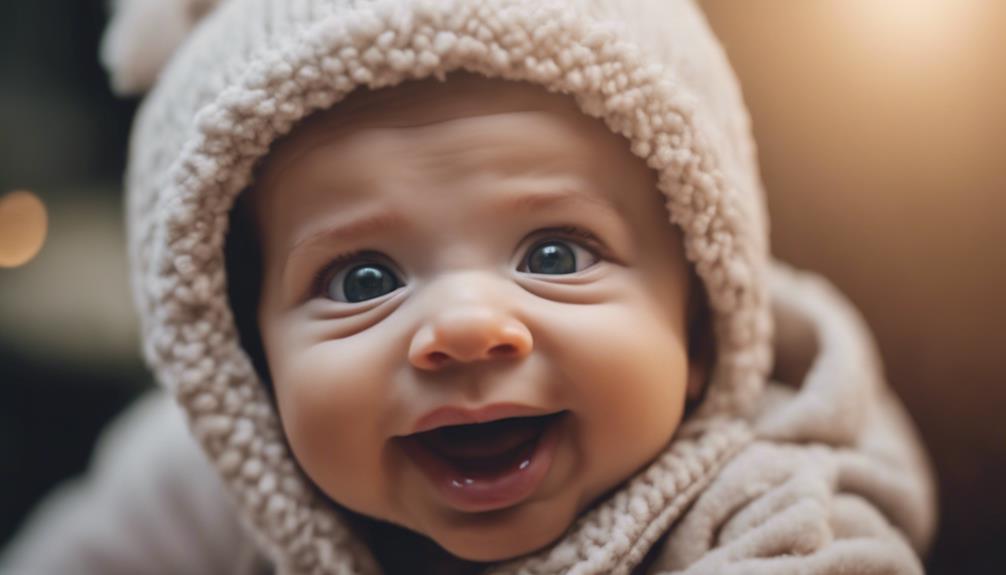
When your baby starts to coo, it's their way of saying, 'I love you.'
These affectionate sounds are their early attempts at communication, showing their joy and connection with you.
Responding to their cooing with conversation can strengthen your bond and nurture their language development.
Vocalizes Affection Sounds
Babies typically begin to vocalize affection sounds, known as cooing, around three months old. When your little one starts cooing, it's a heartwarming sign of their growing ability to communicate and show affection.
These soft, melodic sounds are your baby's way of connecting with you and expressing their emotions. By responding to your baby's coos with warmth and attention, you aren't only strengthening the parent-child bond but also fostering their language development.
Cooing marks the beginning of your baby's journey towards more advanced communication and social interactions. It's amazing to witness this early form of expression that sets the stage for future language skills.
Embrace these sweet moments of cooing as they pave the way for deeper connections between you and your little one. Cherish these simple yet profound interactions that lay the foundation for a lifetime of love and understanding.
Shows Joyful Expressions
Witnessing your baby's joyful expressions, such as cooing, is a vital experience that signifies their emotional connection to you. When your little one starts to coo, babble, and make those adorable sounds, it's a clear sign of their love and affection towards you. These vocalizations are more than just sounds – they are the building blocks of a strong emotional bond between you and your baby.
| Joyful Expressions | Impact on Emotional Bond |
|---|---|
| Baby smiles when cooing | Strengthens emotional connection |
| Cooing shows love and affection | Fosters positive emotional development |
| Encouraging vocalizations | Deepens bond through interaction |
Responding to your baby's coos with smiles, eye contact, and engaging conversations not only brings joy to your little one but also strengthens the emotional connection you share. Embrace these moments of joyful expressions, as they play an essential role in building a positive and loving relationship with your baby.
Comes Alive in Your Presence
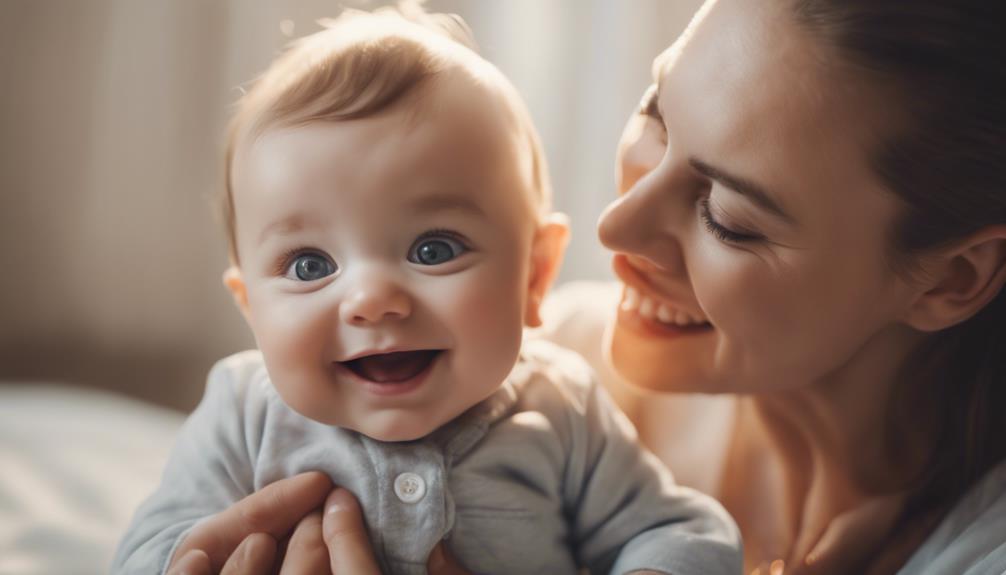
In the presence of someone they love, your baby truly comes alive. It's in these moments that you see the depth of their emotions and connection to you.
Here are some ways your baby expresses their love and attachment:
- Excitement and Joy: Your baby lights up with happiness when they see you, a clear indication of their deep love for you.
- Seeking Comfort: Babies reach out for hugs and cuddles in your presence, seeking the safety and closeness that you provide.
- Spontaneous Smiles: A radiant smile from your baby is a heartfelt display of their affection and emotional bond with you.
- Imitation of Affection: Your baby may mimic your loving gestures, like giving kisses, to show their love and connection.
Wants to Be Held by You
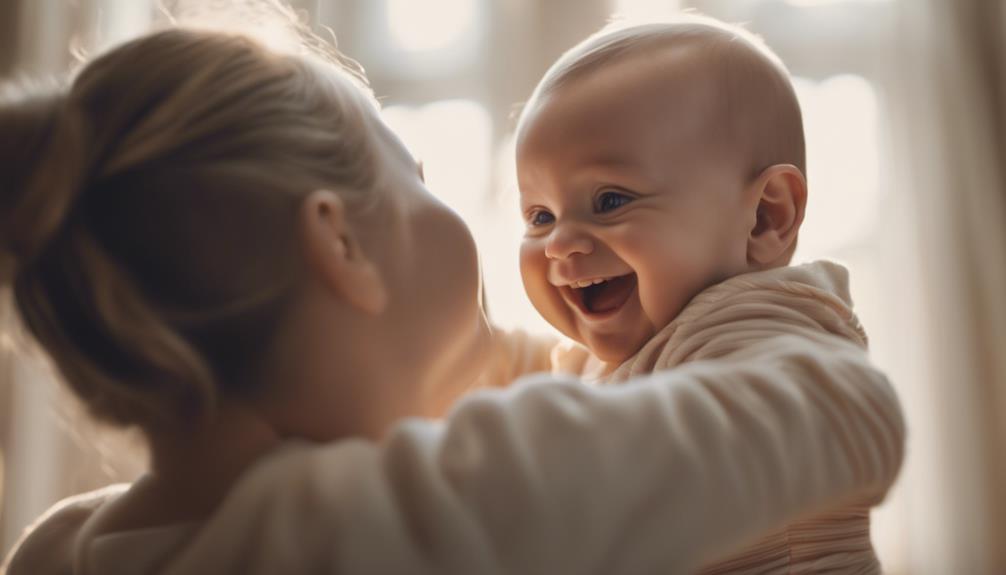
When your baby seeks to be held by you, it's a heartwarming display of their love and need for closeness. Holding out their arms towards you isn't just a physical act; it's a way for your baby to express their emotions and strengthen the bond between you. This gesture is a sign of attachment, showing that your baby feels safe and secure in your arms.
By wanting to be held, your baby is communicating their trust and reliance on you for comfort and care. Responding to your baby's desire to be held helps them feel loved and nurtured. It fosters a sense of connection and emotional security, building a strong foundation for your relationship.
Embrace these moments when your baby reaches out to you, as they're precious opportunities to deepen your bond and show them that they're cherished. Your willingness to hold and comfort your baby not only meets their emotional needs but also reinforces the love and trust they've for you.
Can't Bear to Say Goodbye
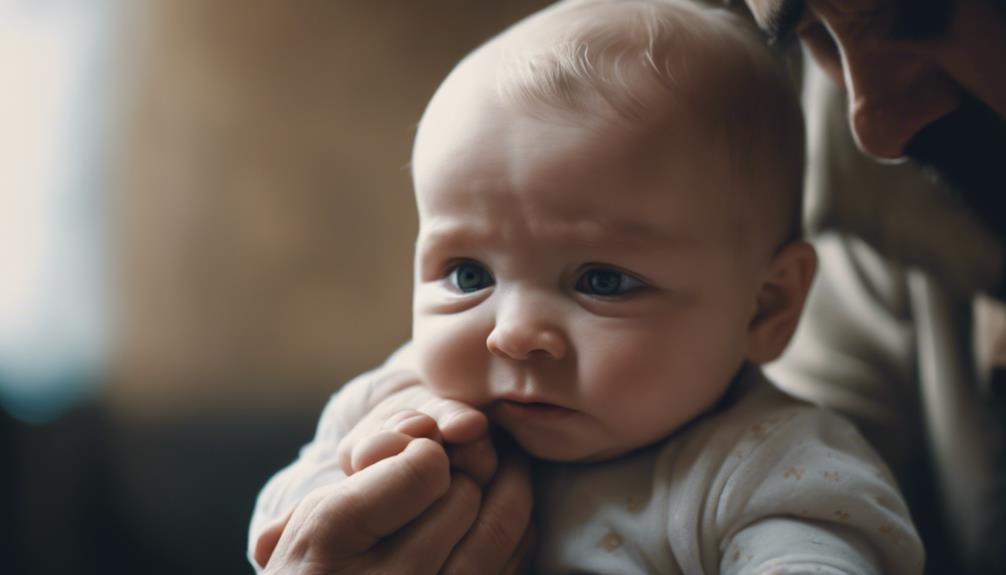
If your baby is struggling to say goodbye to you, it could be a sign of their strong emotional attachment. Separation anxiety is a natural part of a baby's emotional development, and seeing your baby cling to you or display distress when you're leaving indicates the depth of their attachment to you.
Here are some ways to help your baby cope with goodbyes:
- Reassure them: Comfort your baby with soothing words and gentle touches to let them know you'll be back.
- Maintain routines: Establishing predictable routines can help your baby feel more secure during separations.
- Practice short separations: Start with brief separations and gradually increase the time apart to help your baby adjust.
- Offer comfort items: Providing a favorite toy or blanket can offer your baby comfort and familiarity in your absence.
Saves Challenging Behavior for You
Your baby may intentionally save challenging behavior for you as a way to express trust and comfort in your relationship. When babies learn to express their emotions, they often turn to their primary caregivers for guidance and support. By testing boundaries and exhibiting challenging behavior with you, they're showing a deep level of attachment and a healthy emotional connection. This behavior is a sign that your baby feels secure in your relationship and trusts you enough to share difficult feelings.
It's important to understand that when your baby displays challenging behavior towards you, it's not meant to harm but rather to communicate their emotions. By responding positively and providing a safe space for them to express themselves, you're strengthening the emotional bond between you and your little one.
Plants Big Kisses on You
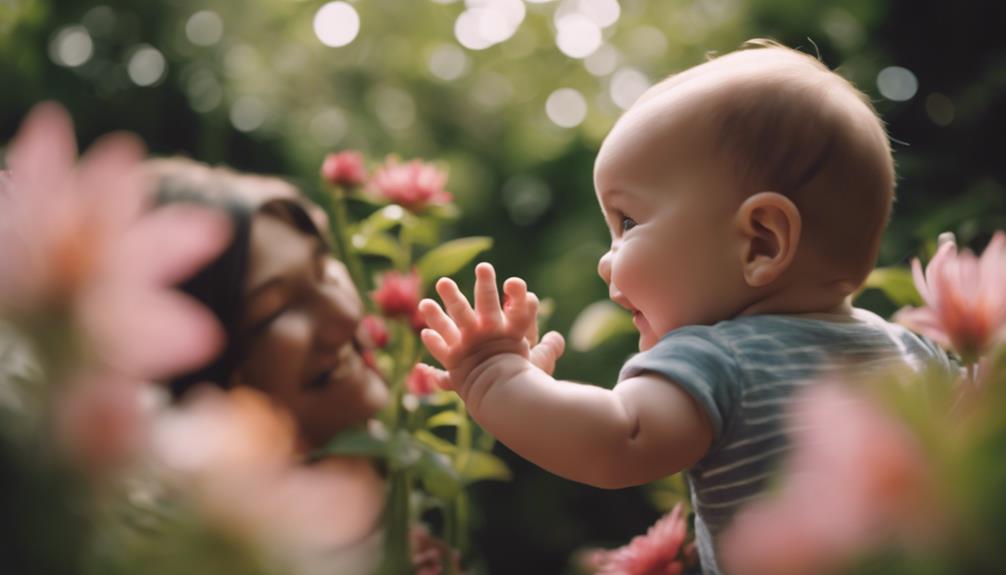
Babies often joyfully plant big kisses on their caregivers as a heartfelt display of affection and trust. It's a beautiful moment that strengthens the bond between you and your little one. Here's why those baby kisses are so special:
- Expressing Love: When your baby gives you kisses, it's their way of showing love in a pure and innocent form.
- Building Trust: These affectionate gestures help build a strong foundation of trust between you and your baby.
- Learning from You: Babies observe and imitate the actions of their caregivers, so those sweet kisses are a reflection of the love they see from you.
- Emotional Connection: Physical affection, like giving kisses, allows babies to express their feelings and form a deep emotional connection with you.
Frequently Asked Questions
How to Tell if a Baby Is Attached to You?
You can tell if a baby is attached to you by observing their seeking comfort and closeness, recognizing you through features, voices, and smells, showing joy with smiles, coos, and hugs, experiencing separation anxiety, and mimicking affectionate gestures.
How Do I Know if My Baby Has a Strong Bond With Me?
You'll know your baby has a strong bond with you when they enthusiastically seek your comforting hugs, display joy upon seeing you, mimic your actions, and show affection through big smiles and coos.
How to Tell if a Baby Loves You?
You can tell if a baby loves you by their seeking comfort in your arms, recognizing you from birth, showing joy when reunited, smiling at you, and seeking physical affection like cuddles and hugs.
Why Does Baby Cry More Around Mom?
Babies cry more around mom because they feel secure and comfortable expressing their needs. The strong emotional bond leads them to seek comfort and connection through crying. They trust mom to understand and respond quickly.
Conclusion
As you bond with your baby, remember to cherish these signs of love and connection. Their recognition of your scent, eye contact, and desire to be held are all indicators of their deep affection for you.
Soak in those sweet smiles and coos, and embrace those challenging moments with love and patience. Your baby's kisses and reluctance to say goodbye are just a few more reasons to revel in the special bond you share.
Enjoy these precious moments together!

